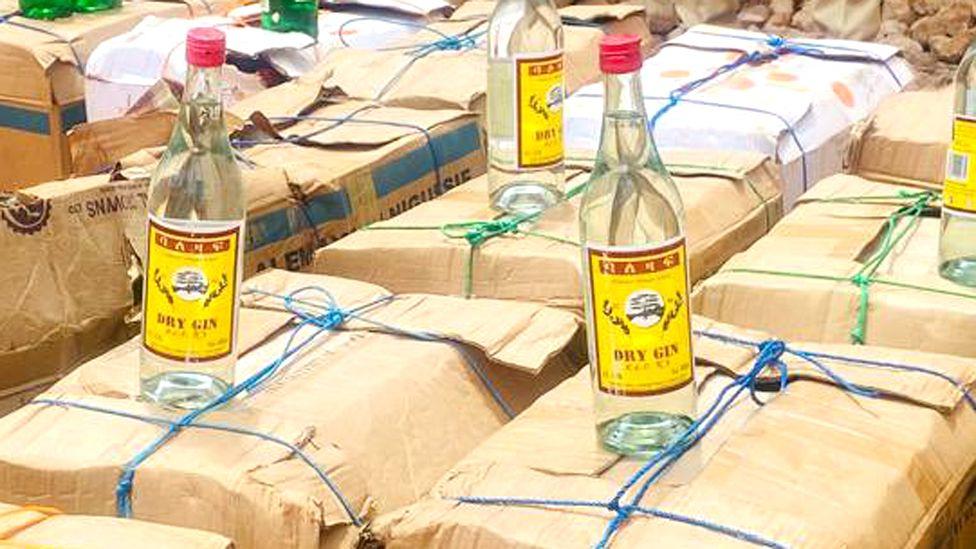The story of Guled Diriye, a 29-year-old alcohol smuggler in Somalia, paints a vivid picture of the dangerous reality faced by individuals forced into illicit activities in pursuit of survival. After returning from a perilous journey transporting contraband from the Ethiopian border, Diriye finds himself overwhelmed with exhaustion, grappling not only with the physical toll of the trip but also with the emotional burden of losing colleagues to violence. Somalia’s laws, strict in adhering to Sharia, deem alcohol illegal, yet demand continues to surge, particularly among the youth. Introduced to smuggling by his friend Abshir, Diriye strategically navigates the treacherous roads and multiple checkpoints manned by armed groups, turning to this high-risk occupation as a means to support his family amidst worsening economic conditions exacerbated by limited job opportunities.
As Diriye recounts the origins of the smuggling trade, he emphasizes the importance of adaptability and pragmatism in an environment fraught with danger. The process of smuggling begins in border towns, such as Jigjiga in the Ethiopian Ogaden region, where the alcohol is sourced and then transported across the vast, unstable landscapes into Somalia. Despite the illegality of their endeavor, smugglers like Diriye find themselves in an intricate web of economic necessity. They meticulously conceal their cargo among legal goods, often going to great lengths to avoid detection by authorities and rival groups. The combination of a highly competitive market for smuggling and a dire necessity to earn sufficient income leads to a high-risk lifestyle that many accept as the only viable option for survival.
The threat of violence is omnipresent in Somalia, where ethical concerns about the effects of smuggling on local communities are overshadowed by personal circumstances driven by poverty. Tribal elders express their frustration over the rise in alcohol-related violence, yet Diriye and others see themselves as survivalists in a state that often fails to provide for its citizens. Although police crackdowns on alcohol have resulted in the seizure of contraband, the smuggling persists, given the continued market demand. The risks extend beyond apprehension by authorities; smugglers frequently contend with armed assailants and territorial militias, which can attack drivers for either political motives or ransom considerations.
Dahir Barre, another smuggler with years of experience, reinforces the perils of this trade, sharing his harrowing tales that illustrate the stark realities of smuggling. Once employed in hotel security with little compensation, Barre transitioned to smuggling as the economy necessitated riskier jobs. While police checkpoints are a concern, the following encounters with groups like al-Shabab heighten the dangers, as they enforce stiff penalties for those caught with alcohol. Although smugglers are sometimes able to negotiate with less organized militias, the issue remains that even minor mistakes can lead to severe consequences, including violence or death.
In recounting past experiences, both Diriye and Barre reveal the psychological scars left by their involvement in the trade. From witnessing the death of a colleague in a sudden attack to grappling with their own feelings of guilt, the psychological burdens of smuggling are immense. They live with constant anxiety, knowing that the work they engage in could cost them their lives or lead to the exploitation of loved ones left behind. Such experiences instill a grim sense of fatalism, as they note, “Death is something that is predestined,” highlighting a precarious acceptance of their harsh reality.
Despite the trepidation that comes with their work, both men express a deep sense of resignation about the choices they are forced to make, driven by the pressing need to survive in a country where many infrastructures have crumbled. While Diriye’s neighbor Abshir distanced himself from smuggling after losing his nephew, Diriye remains steadfast, revealing that temptation and poverty cannot be easily dismissed. The stark contrast between the life of mortals struggling for existence against the backdrop of economic deprivation emerges strongly in their narratives, emblematic of a life lived on the frail edges of legality in conflict-ridden Somalia. As the smuggling network continues unabated, the repercussions linger, reflecting not only on their fates but also on the broader social context within a society yearning for stability and opportunity.

